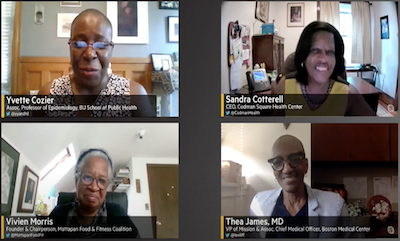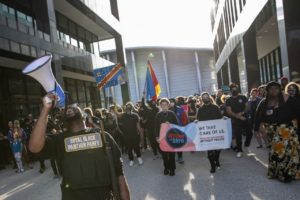Health disparities, structural racism, and Boston’s progress and shortcomings on tackling these systemic issues were the center of discussion on July 30 during “Black Boston: Building Healthy Cities”—the first of a four-part, virtual discussion series featuring influential Black leaders in Greater Boston. The series was organized by BU Initiative on Cities, the BU Office of Diversity & Inclusion, and WBUR CitySpace.
Moderated by Yvette Cozier (SPH’94’04), assistant dean of diversity, equity & inclusion, associate professor of epidemiology, and SPH alum, the discussion featured candid insight from Vivien Morris (SPH’98), SPH alum and founder and chairperson of the Mattapan Food & Fitness Coalition (MFFC), Thea James, vice president of mission at Boston Medical Center (BMC), and Sandra Cotterell, CEO of the Codman Square Health Center (CSHC). Drawing upon their long-established careers in Boston’s health industry, the panelists reflected on the city’s past and present challenges with racism and racial disparities in health care and healthy food access, and explored actions that the next generation of leaders can take to promote inclusivity and equity among Boston residents.

The conversation began with how each organization has responded to the COVID-19 pandemic, which has disproportionately impacted Black people and other people of color in Boston, throughout Massachusetts, and nationwide.
MFFC was forced to shut down immediately in March once the virus started to spread, Morris said. But the grassroots organization, which provides programs and initiatives to promote physical activity, food access, youth development, community engagement, and more to Mattapan’s majority African American and Latinx population, shifted much of its programming online.
“While this has been a challenging time, it’s really brought out the best in people,” said Morris. MFFC’s Vigorous Youth group now meets on Zoom to share healthy recipes, she said. The Mattapan Square Farmers Market and community garden support are in full swing, and Mattapan on Wheels, an annual, youth-led biking event, is virtually celebrating its 10th year. Through health education and resources, MFFC’s goal is to help people discover “that making the healthy choice is the easy choice,” Morris said.
Cotterell and James shared how BMC and CSHC, respectively, altered their operations to administer COVID-19 testing and connect patients to health and economic resources. Initially, the health center set up a patient testing area in their parking lot, “but we quickly expanded the testing to the community so that we could be a resource for everyone,” said Cotterell. BMC’s Preventive Food Pantry also served as a lifeline for low-income or newly unemployed patients, said James.
“Being a safety-net hospital, we’re used to crises,” said James. The hospital partnered with food delivery services “to make sure that people had the basic things they needed and would not go hungry.”
The speakers reflected on how access to health and healthcare resources for the Black community in Boston has changed over the years. Years of government disinvestment in Mattapan has fueled unequal opportunities and perpetuated health disparities among Black residents, Morris said. She cited the expansion of Boston’s Neponset River Greenway as an example—the eight-mile, multi-use pathway was constructed in 2001 and expanded through several majority-white neighborhoods, but it wasn’t until 2017 that the pathway was extended to Mattapan Square.
“Every section of the 8-mile biking path for the white community was completed, but the one section for the black community took 16 years to be completed,” said Morris. “The challenges are real. The need to address and call out the inequalities in our city are real.”
Black representation in leadership roles is a crucial step in achieving inclusivity and equality, the panelists said.
“I’ve been a dietician for 30 years, and when I began in this field, about 12-14 percent of all dieticians were African American—now that number is 2.4 percent,” said Morris. That is, in part, because of systemic racism and inequalities in the US educational system, she said, such as decreased funding for historically black colleges and math and science programs for underserved students of color.
“Equity is the one thing that will alter the trajectory of the life course of people,” said James. “We need create pipelines out of inequities, out of poverty, out of dependency. Imagine what our economy would be like if more people were able to contribute to it versus rely on it?”
“Now is the time to take a stand” while the world is paying attention to racial injustice and health disparities, said Cotterell. Compared to three decades ago, most CSHC patients now have some form of health insurance, but many Black and Latinx patients are hesitant to speak candidly with white doctors, she said. “We need to build a pipeline of more diverse healthcare providers—when patients speak with someone who looks like them, they share their story, and that goes a long way into getting a [healthcare] plan for them,” Cotterell said.
“How do we engage with political leadership to make changes and seize this moment?” asked Cozier.
“We have to engage all people, especially younger people, and connect them to politics, to direct advocacy, and to the importance of having their voice heard,” said Morris. “This year’s election is crucial and we have to get everyone out to vote.”
To hear more from the speakers’ discussion, click here. The next event, Black Boston: Telling Our Stories, will take place on Aug. 27.




